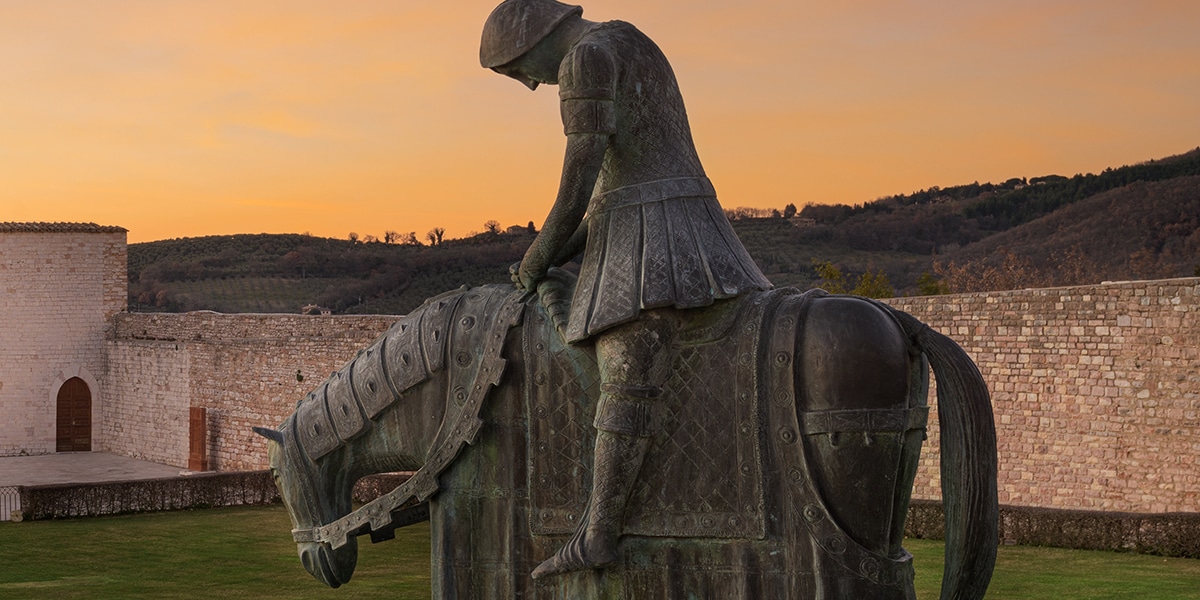This Franciscan Spirit blog series explores how study and theology impact the lived experience of faith. St. Francis of Assisi was known to caution his brothers from owning books, emphasizing lifestyle over the study of theology. He believed that while knowledge “puffs up,” charity “builds up.” Early in 1222, however, Francis granted permission to St. Anthony of Padua to teach theology. Wrote Francis to Anthony: “It pleases me that you should teach sacred theology to the brothers as long as–in the words of the rule–you ‘do not extinguish the spirit of prayer and devotion with study of this kind.’” This series explores this tension and potential. What does study and theology look like from a Franciscan perspective?
If I were to leave behind an epitaph, it would most certainly read, “Follow St. Francis!”
Where did this phrase come from? While discerning my vocational path, I started receiving providential signs that became sometimes humorous as much as they were awe-inspiring. When I was 22, I first met “St. Frank.” We were introduced by my college chaplain who jokingly, but with a side eye of insistence, overheard me talking about chaplaincy and plans to look at the Jesuit graduate programs. “Oh no,” she shook her head, “the Franciscans are your people, you need to check them out.” After that moment, Francis and Franciscans were suddenly everywhere! One day my GPS literally told me to “follow St. Francis, follow St. Francis,” insisting despite clearly going opposite the direction to the onramp. Turns out, it took me on an unnecessary u-turn down St. Francis street (and despite being Irish there’s no hyperbolic blarney here, I promise you).
Bizarre signs like this kept showing up, to the point that even secular colleagues were noticing there was a coincidence that couldn’t be denied. This culminated in the fateful white smoke announcing that former archbishop Jorge Bergolino was now to be Francis…the first pope to take the name. A year later, I was accepted and began my studies at the Franciscan School of Theology. I was indeed, as Rev. Laura had pointed out, with “my people.” But, I had no clue that this moment would impact the rest of my academic, professional, and personal pilgrimage of spiritual and intellectual growth.
The call to follow St. Francis came at the most pivotal time in my life. It was overwhelming going through immense grief with the loss of a close loved one while also navigating coming-of-age thresholds in that season. The draw to the Franciscan charism was a seeking for something to fill a broken heart and a passion to reach out to others going through the pain I had felt. This way of being part of the Incarnation in the world was a clear vision for what, as St. Francis often remarked, “to do what (was) mine to do” in this weary yet wonderful world.
“This concept of integrating one’s own journey into practice and gaining the practical and theological formation of sacred soul work became the hallmarks of a Franciscan education.”
This concept of integrating one’s own journey into practice and gaining the practical and theological formation of sacred soul work became the hallmarks of a Franciscan education. This pedagogy was derived from its original founders, Francesco and Chiara, because this was—and is—a movement that didn’t remain in Assisi. The outward ebb and flow in this movement constantly elevates our understanding in acting as the Body of Christ in the human family around us. I was transformed by this framework in my own ministry, being educated by the transitus as Sister Death taught me to accompany the sick and dying as a board-certified chaplain after I graduated.
While twists and turns have developed along the way, I often look into the images of this gentle soul of fierce devotion, and pose the musing, “What is coming next St. Frank, where am I being called?” Whatever lies ahead, I trust that so long as I return to the path to “follow St. Francis” he will lead me to our brother Christ. I am forever grateful and spiritually bonded to the anam caras—the soul friends—of teachers and colleagues who guided me along the road, especially at FST. I truly can only lead, as much as I follow.








